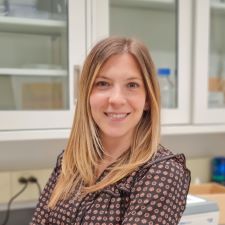Carolina Trenado-Yuste, PhD
Carolina Trenado-Yuste, PhD

Breast cancer is the most frequent cancer in women and the second-leading cause of cancer deaths in women worldwide. Triple-negative breast cancer is among the most aggressive subtypes; its name refers to the fact that it lacks all three primary markers of breast cancer, making it particularly challenging to detect and treat. Although our ability to detect early-stage breast cancer has improved substantially over the past few decades, anticipating whether and how fast a tumor will progress to metastatic disease remains challenging. Dr. Trenado-Yuste aims to improve our ability to predict a tumor's disease course and response to therapy by creating a new framework of biomathematical models and experimentally engineered tumors, which may aid in prognostication and decrease cancer-related deaths.
Experimental research in cancer biology also drives a need for new computational models. This project focuses on mathematical modeling, with an emphasis on developing agent-based and pharmacokinetic models, to help clarify how tumor spheroids progress and respond to drug treatments. The importance and innovation of the proposed theoretical and computational methods lie in their potential to identify the optimal combinations of personalized treatment schedules for individual patients.
